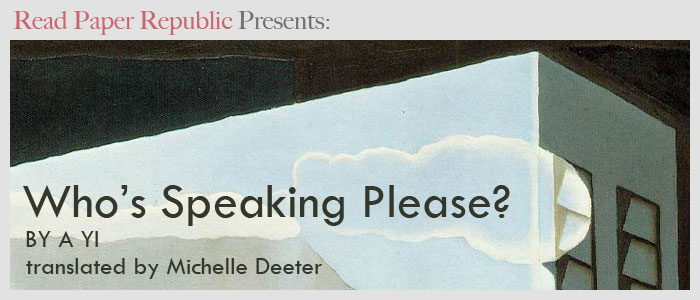Zhongwei had been in a daze ever since he came back home. There was still a dent in the centre of the pillow. The covers had been twisted by the snake-like grip of their legs. One flip-flop was in the bathroom, and one was just outside the door—she liked to walk around barefoot. The glass of water stood on a table, half-drunk. His underwear and shirt were folded beside the bed. She’d worn them while sitting on the windowsill early that morning, after the rain, the sea breeze playing with her long hair. She came, she saw, and she consummated—this was clear from the signs scattered about the flat. But now, Zhongwei was alone, like a stupid block of wood.
An old saying floated into his head: ‘A thousand ships sailed past, but none was yours.’ He stood by the window and looked down. The view of the street was obstructed; he saw the cars appear without warning and then gradually drive out of sight. He was sure that he loved her utterly, completely, hopelessly; whenever she was away it felt like a knife was scraping against his bones.
Theirs was the kind of eternal love that transcended history, wars, science and technology.
It was only a few hours since they parted, but he still couldn’t stand the emptiness of being alone. He decided to call her. She would probably be eating, but he couldn’t help it. He wanted to shout at the top of his lungs, ‘I love you! I miss you so much it hurts!’
She picked up almost immediately.
‘Hello, who’s speaking please?’ she said awkwardly.
‘Who is it?’ A man was sitting beside her.
‘Yes, I will take care of the matter you’ve asked me to take care of, but right now I’m eating with a friend. Goodbye,’ she said.
It took him a while to come back to his senses. The words filled up every space in his head: fuck, oh fuck, motherfucker. Then he thought that it might just be a misunderstanding. Maybe she was like Marguerite Gautier in The Lady of the Camellias. A courtesan, Marguerite tried to earn enough money to support herself and Armand by neglecting her poor lover and entertaining a wealthy duke. The overly sensitive Armand misunderstood her and never forgave her. She lived in agony for the rest of her life.
Was that it?
Impossible.
It was clearly a stupid mistake. She didn’t want to ignore the call and hurt his feelings, but she didn’t want to take the call and say anything intimate that would surprise the man she was eating with. Because what else would Zhongwei want to say at that moment except I love you? It was easy to tell from the question ‘Who is it?’ that the man was sitting quite close to her.
His heart tightened.
She was twitchy on the phone, like a rabbit trying to hide in the bushes. Nothing could be more hurtful. Zhongwei felt a deep chill. The distance between them had never been so vast.
A little later, she called back and, apologetic, explained what had happened. Zhongwei was like a gambler who had lost all his money but was still staring at the prize pool enviously, trying to think of a way to get a few chips back. He would take what he could get.





Comments
In the Asia House video clip (starting 10.47) A Yi talks about the original Chinese title of "A Perfect Crime" being 下面我该干些什么 "What Should I Do Next?" He says that this sentence is a quote from Borges. Can anyone identify the original sentence from Borges and which work it comes from?
Helen Wang, June 21, 2015, 2:40p.m.
I think it is "What's it going to be then, eh?" in Anthony Burgess's "A Clockwork Orange".
Long Yang, June 21, 2015, 6:25p.m.
Ha, everything makes a bit more sense, then. That would actually be a pretty good title for the English translation! And funny how "Burgess" turned into "Borges".
Eric Abrahamsen, June 21, 2015, 6:42p.m.
Thanks, Long Yang, and also Joel Martinsen who emailed me earlier. Joel noted that the translation of "What's it going to be then, eh?" in the Chinese translation of "A Clockwork Orange" was "下面玩什么花样呢?"
Helen Wang, June 21, 2015, 6:59p.m.